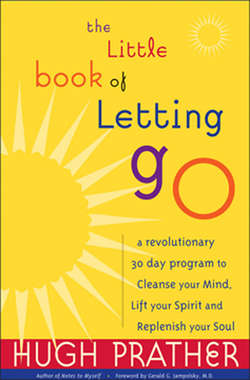Читать книгу The Little Book of Letting Go - Hugh Prather - Страница 12
На сайте Литреса книга снята с продажи.
Big Truck
ОглавлениеWhen Gayle's and my son, John, was two years old, we lived in Santa Fe, New Mexico. One day he and I were standing on a street corner, waiting for the light to change, when a semi slowly began rounding the corner just as the walk light came on. Suddenly I was caught up in the delay this truck was causing by passing in front of us. Then I heard John say, “Big truck.” I looked down and his eyes were wide with amazement. I looked at this enormous semi passing so close we could have reached it in one step. And I said, “Big truck.” Because now I really saw it. It seemed like the mother ship in a Star Wars movie.
Maybe I'd been thinking that the truck shouldn't have been there or that what I had to do was more important than what the truck driver had to do. Whatever it was, that thought was all it took to keep me from enjoying just standing beside my son and holding his hand. Just one unnecessary thought. Little children have very few, if any, unnecessary thoughts, and that's why they are usually focused, present, and happy.
A mother bird sees a snake climbing her tree and thinks “snake.” Immediately she starts dive-bombing it. I have seen what a bird can do to a snake that doesn't climb down fast enough. However, it's clear what would happen to her babies if that same mother bird saw the snake and thought, “I do more good in the world than that snake.” Or, “I don't like that snake; it's slimy looking.” Or, “A snake in the grass has no business being in a tree.” Or, “I'm going to give that snake a piece of my mind.”
Not only do we give people a piece of our mind, we give them a piece of our happiness, wholeness, focus, and sometimes, a piece of our health.
A still mind sees what is here. A busy mind sees what is not here. The one who is present is nothing more or less than the one who is present. Therefore, look at the person who is here. We can cover that person with whatever thoughts we wish, but that won't get us a different individual.
Our lives are filled with useless battles because our minds are filled with useless thoughts. We never finish thinking about anything. We carry around unhappy scenes from the past as if they were still happening, and we chew on the memory of whatever we just did. This glut of thoughts profoundly affects the world we perceive and the life we live. A man who sees his mother in every woman he meets can't see the women he meets. This one unnecessary thought lands him in solitary confinement and assures he will die alone. A mother who can't accept her son-in-law into her heart because he has “a lot of metal” (say, double earrings, a nose stud, and something rumored to be somewhere else) merely attacks her own capacity to love and be happy. She doesn't change the son-in-law and she doesn't eradicate her daughter's love for him. Yet this one unnecessary thought means her daughter will not have the mother she needs.
These last two are somewhat poisonous examples of what happens when we don't let go. Yet throughout each day, failure to let go can eat up every small chance we have to be happy. Just trying to write this page has been a typical example.
